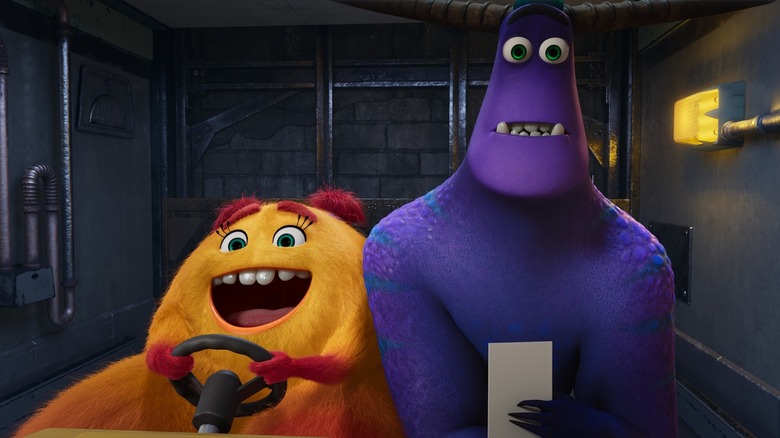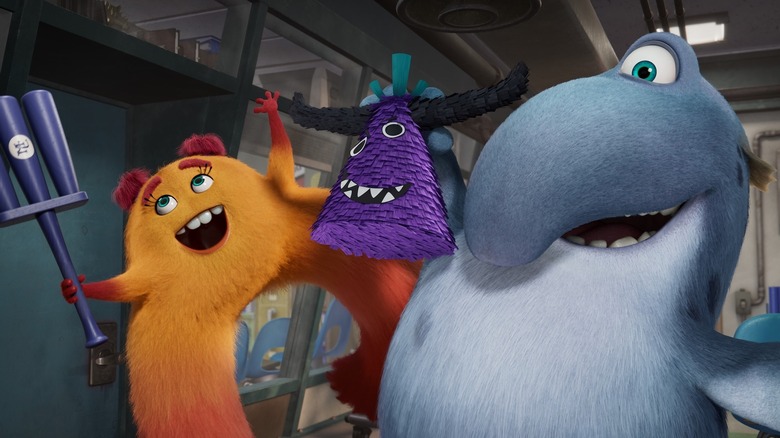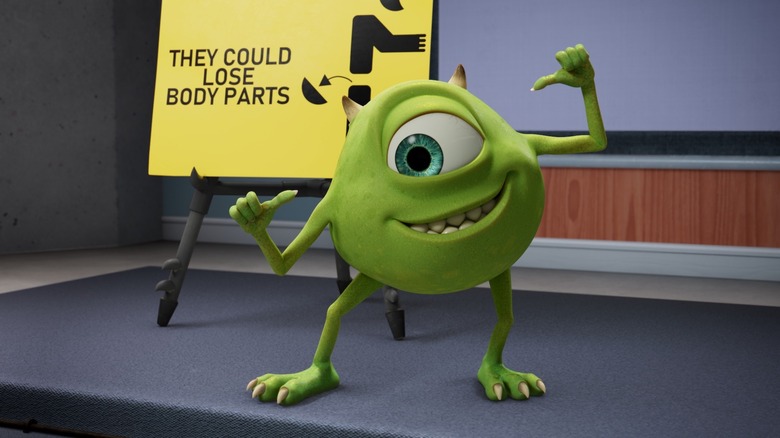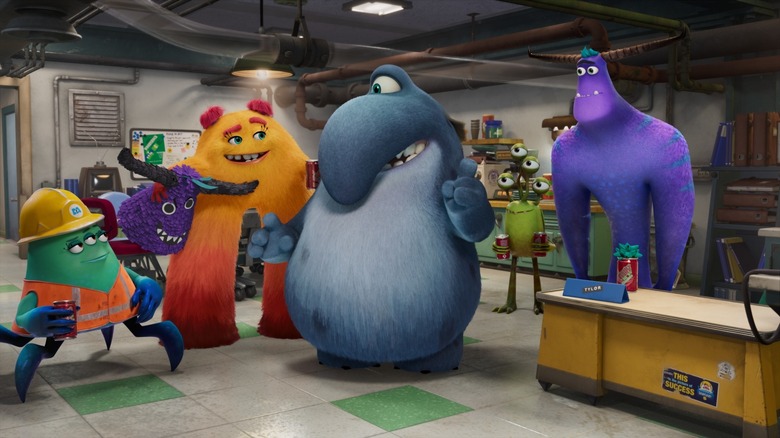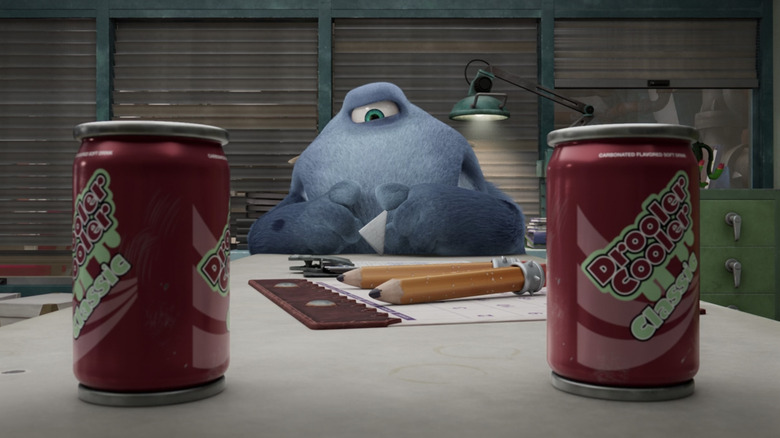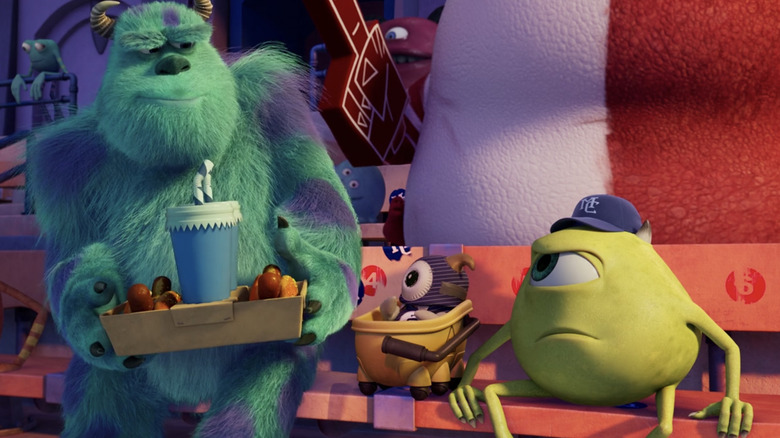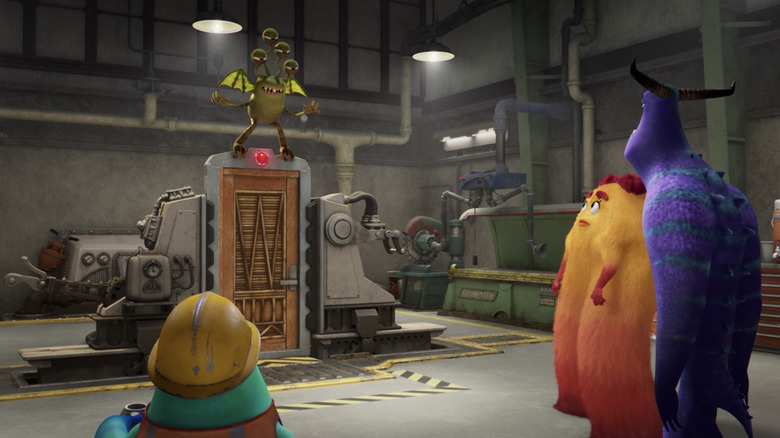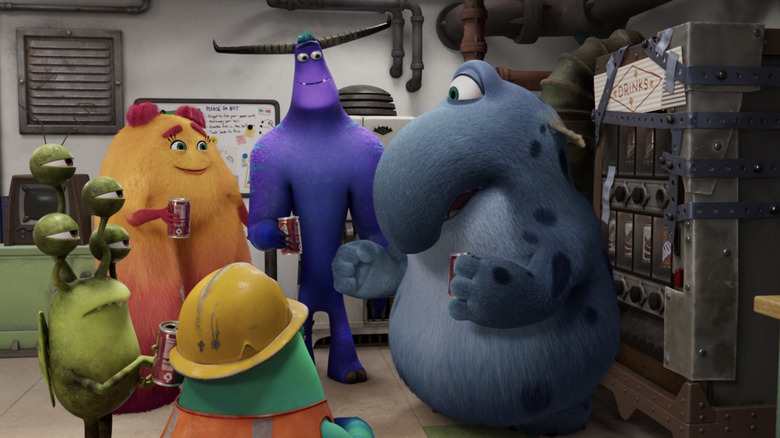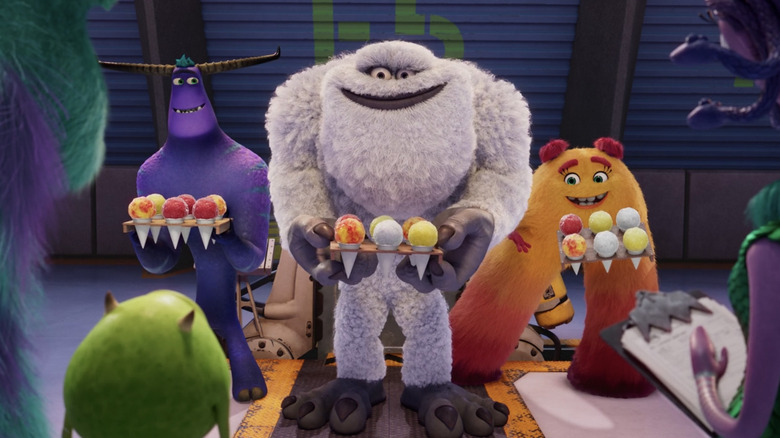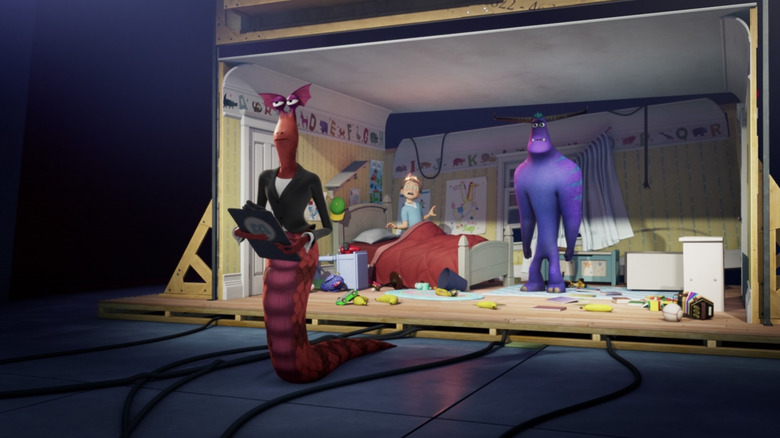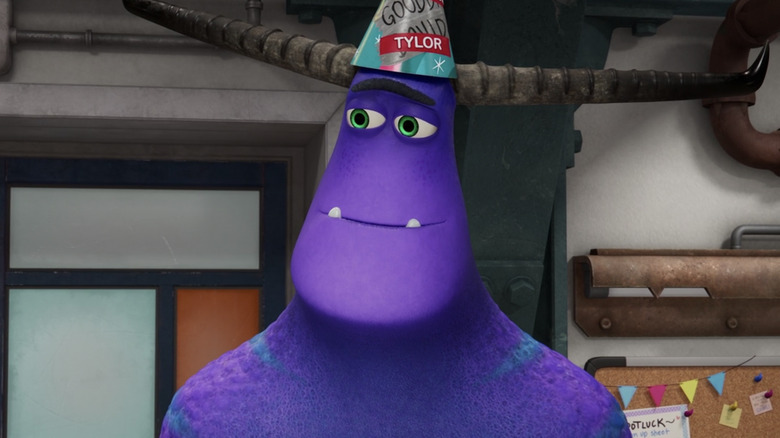Things Only Adults Notice In Monsters At Work
"Monsters at Work" begins with a culture-defining business model change in the "Monsters, Inc." universe, due to wicked CEO Henry J. Waternoose III's (James Coburn) replacement by James P. "Sulley" Sullivan (John Goodman) and Mike Wazowski (Billy Crystal). Instead of the lovable animated monsters' power spawning from the screams of human children, the source is rightfully shifted to the sound of laughter. These changes don't come easy to recent college graduate Tylor Tuskmon (Ben Feldman), however. He went to school to become a scarer, but when he arrives at his dream gig on Day One, he finds that Monsters, Inc. has changed tactics entirely. Laughter is the order of the day now, not shrieks, meaning his skills are utterly inapplicable.
In response to this cultural shift, Tylor's aspirations of becoming a jokester on the Laugh Floor begin take shape. While Tylor dreams of working alongside his heroes Mike and Sulley, he finds himself toiling as a mechanic on the Monsters, Inc. Facilities Team (MIFT) in the meantime. Though "Monsters at Work" is a lighthearted romp for all ages, there are many elements within it that go unnoticed by younger viewers. We're here to reveal those things only adults notice in "Monsters at Work," from its exploration of workplace attitudes to its jokes about college degrees.
A not-so-subtle knock on higher education
Not only is Tylor a scare major graduate of Monsters University, he has the talent to match Sulley's scaring abilities. But really, that's his only skill. At first, that doesn't matter: He's a hot commodity brought up to the big leagues shortly after graduation. Yet his dreams are dashed upon his arrival, given the business' shift. In examining this, "Monsters at Work" takes many digs at the institution of higher education.
Tylor attends school to become a scarer, only to become a mechanic. Val Little (Mindy Kaling), Tylor's one-time classmate and new "best friend," even makes a joke about student loan debt and how Tylor must have a lot since he actually finished his degree. Val jokingly shines a light on the fact that she dropped out of college, whereas he graduated –– yet they end up working at the same place.
A common criticism of college is that it doesn't prepare students for the real world, not to mention the fact that jobs and professions can drastically change by the time a student finishes school. In Tylor's case, his industry transforms entirely, leaving him with a very refined and totally useless skillset. He realizes that he needs more training to succeed in his field, so he begins taking comedy classes to hopefully one day work permanently on the Laugh Floor. This might seem like a minor obstacle to younger eyes, but it's an issue that harkens back to the real world for adults.
An all-star cast of real-world jokesters
Although you don't have to be a specific age to recognize actors' voices in animated films, it certainly helps to be a bit older — you can only see so many movies when you've got no more than a handful of years' worth of cinema experience, after all. "Monsters at Work" is flooded with an all-star ensemble cast adults will recognize most of immediately. Not only that, but many of these cast members are especially well-suited for the company's new business model, as they're celebrated real-world comedians. If only Tylor knew he's actually surrounded by big-league jokesters!
Surely, fans of the first two installments will recognize John Goodman voicing Sulley and Billy Crystal voicing Mike. However, other comedic geniuses now grace the "Monsters, Inc." universe with their presence. Case in point: The first two episodes alone feature Ben Feldman ("Superstore") voicing Tylor, our main monster with a now-misplaced gift for scaring people. Mindy Kaling ("The Mindy Project") voices the upbeat and energetic Val Little. Henry Winkler ("Happy Days") voices Fritz, the scatterbrained yet proud boss. This is only scratching the surface of the talent that pleasantly terrorizes the screen in "Monsters at Work."
Exhausted employees pursuing dangerous deadlines
"Monsters at Work" is a show about life at the office, however fantastical that office might be. In skewering the world of memos and deadlines, it comically shines a light on the unfair demands commonly placed on real-world workers — as well as highlighting how they cope with such inflated expectations. After Monsters, Inc. turns its attention to bottling the sound of laughter, Mike works ... and works, and works, and then works some more. In one scene, his big green eye is bloodshot. He's clearly been burning the midnight oil, and then some. Many adults in the audience will wince in recognition — they've definitely been there before.
Many monster employees tell Mike that they counter burnout with energy drinks. This is familiar to many grown-ups with a taste for caffeine — but this universe's "five-hour-energy" thirst-quencher has morphed into a disturbing 36 ½-hour can of energy. That's more than a full day's worth of eye-popping attention juice. This is funny, but it's also pretty serious: There are countless horror stories out there regarding just how overworked employees are in nearly every field, sector, and trade. Exhaustion is all too real, and all too familiar. Mike gets his own taste of this — until he passes out at work, that is.
Work hard, play hard
One thing is made clear from the very beginning of "Monsters at Work": Tylor doesn't want to be part of MIFT. For one thing, he didn't go to school to become a mechanic –– and, well, that's the only reason he needs to be discouraged by his new career prospects. His MIFT colleagues come off as a joke to Tylor, who arrives with little respect for what they do ... until the second episode, when he sees them in action. They're fearless, competent at their jobs, and they even save Mike –– with the help of Tylor, of course. Upon completing this act of valor, the MIFT team celebrates by going to the vending machine and cracking open a few cans of cold deliciousness. Tylor's one-eyed monster boss Fritz says the first round is on him, and Tylor stops just short of saying the next one is on him. That's definitely a sentiment plenty of bar-hopping adults will recognize.
Although it's easy to miss as a child, it's not hard for a more seasoned audience member to realize that MIFT has a work hard, play hard mentality. When they work, they put all their attention and effort to the task at hand, yet when they're off the clock, all focus goes to lightheartedness and enjoying the present moment. And boy, do they enjoy it. This is charming, but it's also healthy — no one can function without fun, as many grown-ups learn the hard way.
The right work mentality
The world of "Monsters at Work" is full of passionate monsters pursuing their dreams, day in and day out. MIFT members in particular have an ideal work mentality. When they don't have anything to fix, they don't try to look busy for the sake of looking busy. Instead, they work when they have to work, and take necessary downtime when there's nothing to do. Not every office environment is the same, but it's pretty typical for employees to feel pressured into looking busy while they're on the clock, even if there's no work to complete. Witnessing the MIFT work mentality is a refreshing contrast — they're trusted enough to be allowed to relax.
Fritz is playing with a paper football in Episode 3, "The Damaged Room," when a new order comes in. His employees appear to be waiting around for a maintenance job as well. As soon as the request is dropped on their desks, the MIFT members jump into action and fix the damaged room. Okay, so it takes them a while, as Tylor is approaching every task as a beginner who's been thrown into the action with no notice and little knowledge. But it all works out in the end: Tylor, Val, Katherine "Cutter" Sterns (Alanna Ubach), and Duncan P. Anderson (Lucas Neff) fix the damaged room without the humans noticing. Downtime pays off!
Baby Snore's parents are conveniently oblivious
Although it's obviously for comedic effect, baby Snore's parents are ludicrously unaware of what's going on in their child's bedroom. In case you weren't keeping score, a monster tries to make Snore laugh, but instead damages her bedroom. Her parents don't notice. Then, Mike takes the baby, because the MIFT members have to fix the room. The parents still don't notice. Mike and Sulley proceed to take baby Snore to a baseball game, give her a rotdog (a monster hot dog, naturally), and get into a fight with another monster.
While Mike and Sulley are at the sporting event, Snore's parents finally come into the room to check on their child. Duncan covers for the monsters by pretending to sleep in the crib, hidden by a blanket. Duncan doesn't know how human development works, so he talks to the parents in complete sentences. In response, the parents declare their baby a genius. So not only has the baby been abducted by monsters, she's at a baseball game eating a monstrous snack made of who-knows-what, and has been replaced by the worst baby impersonator of all time. Her parents don't figure any of this out. Yikes, guys.
The slightest amount of power turns Duncan into a completely different monster
Before embarking on his vacation in Episode 5, "The Cover Up," Fritz uses a spinning wheel to decide who the supervisor will be while he's away. It lands on Val, which makes Duncan throw himself a one-monster pity party. Feeling bad for him, Val tips the wheel so it lands on Duncan's name instead. And that's when the small amount of power zooms directly to Duncan's head.
Although Duncan is only the boss for a short amount of time, he treats his employees like they're beneath him. Case in point: Duncan makes Tylor roll out a red carpet and announce him with a loudspeaker when Duncan enters the office. Duncan even briefly rides on Tylor to get around. These events are, of course, comedically portrayed. But adults are a lot more likely to watch these scenes and recall their own nightmarish bosses. It might seem harmless to a younger viewer, but this type of behavior can have a lasting effect on other people (or, in this case, monsters).
It's not long before everything goes wrong under Duncan's leadership, putting the entire company at risk. Luckily, Fritz saves the day when he returns from his trip. Apparently, Fritz is actually competent at his job, despite the spinning wheel fiasco.
Maintenance workers in the spotlight
In the real world, high-powered CEOs and other glamorous professionals tend to get more credit than the many lower-ranked employees operating under them. However, "Monsters at Work" refreshingly puts maintenance workers in the spotlight, while making fun of the people who run multi-million dollar companies.
Episode 6, "The Vending Machine," revolves around the MIFT members' broken office vending machine, Vendy. There's even a funeral for the old contraption after Tylor inadvertently breaks it. The heart of "Monsters at Work" is, well, monsters at work. Beyond that, it's not even about scarers or jokesters, who tend to get all the credit for the company's success. No, "Monsters at Work" is about the MIFT family. There's nothing glamorous or world-saving about them, yet this show pleasantly shines a light on their efforts. These types of professions might not be attention-grabbing, but they are essential. Moreover, the show doesn't miss a chance to make fun of Mike in a leadership position, trying to solve his problems by throwing money at them –– and not even his money, but the company and Sulley's.
In the end, Vendy is replaced with a state-of-the-art vending machine. That machine breaks. Tylor proceeds to fix Vendy and bring it back to the office. Everyone ends the episode on a happy note ... Although the company's morale and numbers are boosted because of Mike's devious plan. Instead of making budget cuts, he bleeds cash –– and still gets all the credit.
Patience is a virtue
More monsters are needed on the Laugh Floor in Episode 7, "Adorable Returns," so Tylor is called up to the big leagues. But he's still a MIFT worker, and soon enough, a maintenance request comes in that Tylor rushes through. This sends the entire system up in flames (metaphorically speaking, of course). If Tylor had only marshaled some patience, he could have fixed the jam sooner and returned to the Laugh Floor.
That said, Tylor's lack of patience sends him through a banishment door that transports him to the Himalayas. There, he meets the Abominable Snowman (John Ratzenberger voices the legendary creature, as well as Tylor's dad), aka the Adorable Snowman, aka the Yeti. Tylor proceeds to save the monster from his unjust banishment.
So, luckily for Tylor, his lack of patience works out in the end. He might just get a chance at his dream gig someday, or he might find peace in his MIFT duties. But either way, Tylor saves the Yeti from a lifetime of exile, which isn't a bad consolation prize. Kids might not see it that way, being blinded by their immediate desires, but adults with perspective fully appreciate the episode's meaning.
Stand-up comedy is no joke
In Episode 8, "Little Monsters," Tylor faces two tough facts: Following your dreams is hard, and stand-up comedy is a difficult field to break into. While not all adults are comedians, seasoned viewers are a lot more likely to have taken a crack at a difficult craft. People can't just grab a microphone, tell some jokes, and expect strangers to laugh — like anything else, they have to work at it.
Being a successful comedian, like anything worthwhile, takes time, patience, and persistence. Comedians spend entire lifetimes honing their skills. Yet Tylor thinks he can just drop some practical joke props on the ground (banana peels, specifically) and expect the creepy-looking child robot to laugh. Tylor continues to come back to the weekly auditions, typically with props as opposed to well-thought-out material. Unsurprisingly, he fails. But in doing this, he's putting in the necessary hours and finding out what works for him. Not everyone can say the same joke and expect similar results from the audience, he soon realizes. As adults know well (especially stand-up comedians), success takes practice. Tylor learns this lesson the hard way.
Talents don't always match dreams, and dreams require growth
Tylor is a young kid just out of college who doesn't yet realize how difficult achieving your dreams truly is. People get comfortable, become complacent, and even change their minds entirely. Tylor comes to understand this better as he grows close to his colleagues and improves as a MIFT member. In Episode 8, "Little Monsters," Tylor actually realizes he's good at being part of MIFT. As adult viewers know, talents don't always match up with dreams. It's okay to pursue something new – changing one's career path is incredibly common. Being a jokester might sound glamorous, but Tylor comes to understand that life spent as a MIFT member could be just as worthwhile.
In Episode 9, "Bad Hair Day," Tylor decides he's going to embrace Plan B entirely and become the perfect MIFT-er. Along the way, he discovers that being a good, reliable, and truthful friend is a lot more important than a job title. Having grown by leaps and bounds, Tylor finally becomes a jokester in Episode 10, "It's Laughter They're After." It hasn't been an easy journey for him — as adults understand, following your dreams never is. You have to constantly work at them until you make it, and even then, some people never do. But if you're willing to be patient and open your mind, as Tylor does, eventually, you'll get where you're meant to go.

